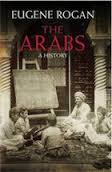Title: The Arabs: A History
Genre: History
Year: 2009
Pages: 650
Origin: bought from Waterstones many moons ago
Nod Rating: 4 nods out of 5
The Arabs: A History is an ambitious study, charting Arab
culture and society across the past five hundred years. It begins with the
fighting Mamluks of the early sixteenth century before ending in the turmoil in
the Middle East in the early twenty-first
century. Heavy concentration is given to the past two hundred years, including
the rule of Muhammad Ali in Egypt
Such a task – of charting a history both rich and divisive –
seems a tall one to accomplish. However, throughout the read Rogan is an able
pair of hands, guiding the reader through the tough differences and the
shocking lows. A key feature of the narrative is the meddling of foreign hands
into the affairs of the Arabs, including the Ottoman Turks and the western powers.
The foundation of the Israeli state, by the power of these western powers, has created
a smouldering sore in the region for the past seventy years. The legacy of this
is clearly seen today, with the region of the Middle East and northern Africa in turmoil.
More so than a history of any other peoples on this planet,
no history of the Middle East can definitely
end. The scant five years since the publishing of Rogan’s book have seen the
Arab Spring and several revolutions, altering the balance within the region and
putting into question the future ahead.
However, such events cannot dismiss the high standard of
work: painstaking research and a wonderful ability to write engaging prose. All
of which gains Rogan’s book a positive 4 nods. Its failing is in its balance of
material; can any history be definitive by neglecting the previous century of
history before the sixteenth century? The Worm believes the answer is a firm “no”.
But he urges anyone with an interest in the Middle East
to pick up a book and dive right in.
Read more

